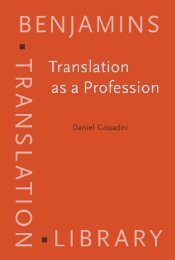Constructing a Sociology of Translation.pdf
Constructing a Sociology of Translation.pdf
Constructing a Sociology of Translation.pdf
- No tags were found...
You also want an ePaper? Increase the reach of your titles
YUMPU automatically turns print PDFs into web optimized ePapers that Google loves.
Between sociology and history 189taking place. Instead, we can observe distinct, still largely regional traditions hidingbehind the dominant, ubiquitous use <strong>of</strong> English.There is an abundance <strong>of</strong> signs that such scholarly localism exists in the internationalfield <strong>of</strong> scholarship, particularly in the humanities and social sciences.Localisms may have flexible borders – “provincialism” is a relative notion – buttheir power <strong>of</strong> attraction is undisputable. How could it be otherwise? The oppositewould mean that, by some miraculous stroke <strong>of</strong> luck, scholars are immune tothe determinations that bear on what might be called the subjects <strong>of</strong> their investigationsand which they pr<strong>of</strong>ess to unveil. <strong>Translation</strong> studies is no exception.For example: the massive contribution <strong>of</strong> a particular group <strong>of</strong> Tel Aviv scholarsto the field is likely to be less spontaneously recognized outside the continentalEuropean tradition (see e.g. Trivedi 2005). No doubt the genealogy <strong>of</strong> polysystemicsplayed a role in provoking those differing appreciations. I am thinking<strong>of</strong> the still largely undiscussed assumptions among that group <strong>of</strong> Israeli scholarsregarding the positive part played by nation states in the institution <strong>of</strong> translation,or the fact that the genealogy in question can be traced to a small number <strong>of</strong>European scholars outside translation studies, at a time when the establishmentand achievements <strong>of</strong> modern nation states were looked upon in a generally favourablelight. Such imaginary constructions as nineteenth-century nation stateswere being seriously questioned when translation studies developed – simultaneouslywith the new cultural history, cultural studies, women’s studies, as well asa considerably revamped anthropology. But the ways in which those “new” areas<strong>of</strong> study crystallized out <strong>of</strong> the cradle <strong>of</strong> former disciplines were clearly markedby the personal and regional histories <strong>of</strong> the individual scholars who, in so doing,gave impetus to the global paradigmatic change taking place in the human sciences.Many among that group viewed themselves at the time as children <strong>of</strong> theEnlightenment.In this context, to envisage the contribution that sociology can make to thefield <strong>of</strong> translation studies is an open invitation to a discussion <strong>of</strong> method. “Method”is understood here as a body <strong>of</strong> scholarly practices, inherited – consciouslyor not – from the traditional disciplines. Both the historical method and the sociologicalmethod emerged in the nineteenth-century in relation to one another,antagonistically. Or rather, the sociological method developed out <strong>of</strong>, against certainpractices <strong>of</strong> inquiry that had been the preserve <strong>of</strong> the historian. Not only that,but for eighty-odd years, a dispute prevailed between the representatives <strong>of</strong> eachdiscipline as to which was more “scientific” in its approach <strong>of</strong> social phenomena.The nineteenth-century historians who inherited the practices <strong>of</strong> inquiry <strong>of</strong>philologists and antiquarians <strong>of</strong> earlier times were first to impose their disciplineas a model <strong>of</strong> truth-oriented research in what would later become known as socialscience. Primary documents, not secondary sources, provided the test case
















